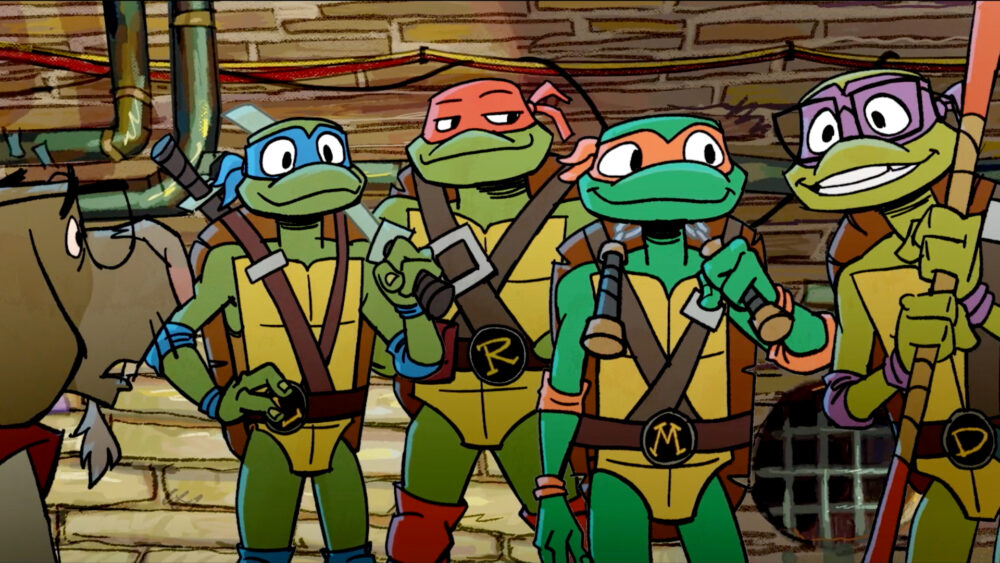

Streaming
Scott Pilgrim Takes Off
“Scott Pilgrim Takes Off,” Netflix’s latest series, is a rollicking journey through the world of video game culture, blending nostalgic references with a fresh narrative twist. Centered around Scott Pilgrim, portrayed with magnetic charisma by Michael Cera, the show skillfully integrates gaming elements into its storytelling, creating a delightful homage to the video game subculture.
The series cleverly employs pixelated graphics, power-up animations, and game-like sound effects to bring the virtual world to life. These visual cues, reminiscent of classic video games, enhance the storytelling and resonate with audiences familiar with the gaming landscape. The attention to detail in recreating iconic gaming moments is commendable, creating a visual and auditory treat for enthusiasts.
The exploration of video game culture goes beyond mere aesthetics; it becomes an integral part of the characters’ identities and interactions. The script intelligently weaves gaming terminology and tropes into the dialogue, effectively blending the real and virtual worlds. The series navigates the challenges and triumphs of the characters through the lens of gaming, making it a unique and engaging experience for both gamers and general audiences.
The ensemble cast, including standout performances from Mary Elizabeth Winstead, Ellen Wong, and Chris Evans embraces the gaming theme with infectious enthusiasm. The chemistry between the characters is palpable, adding emotional depth to the series.
“Scott Pilgrim Takes Off” successfully taps into the zeitgeist of video game culture, offering a nostalgic yet contemporary take on the gaming phenomenon. It’s a must-watch for those who cherish the pixelated roots of the gaming world while providing an accessible and entertaining narrative for a broader audience. The series takes off not only in its title but also in its ability to soar within the ever-expanding realm of Netflix originals.
Streaming
Apple TV+ announces season two for delightful kids and family series “Camp Snoopy

Today, Apple TV+ announced a season two for acclaimed kids and family series “Camp Snoopy,” based on the classic Peanuts comic strip by Charles M. Schulz and directed by Rob Boutilier (“The Snoopy Show,” “Snoopy in Space”). The complete first season of “Camp Snoopy” is now streaming globally on Apple TV+.
After discovering their troop is in danger of disbanding, Snoopy and the Beagle Scouts set off to immerse themselves in nature and the Great Outdoors, with the Beagle Scout Manual as their guide. Meanwhile, Charlie Brown and friends enjoy their summer at Camp Spring Lake, crossing paths with Snoopy as they experience hiking, swimming, sitting around campfires and everything summer camp and the outdoors have to offer.
Produced for Apple TV+ by Peanuts and WildBrain, “Camp Snoopy” is based on the Peanuts comic strip by Charles M. Schulz and is directed by Rob Boutilier (“The Snoopy Show,” “Snoopy in Space”). Executive producers are Craig Schulz, Paige Braddock, Boutilier, Josh Scherba, Stephanie Betts and Logan McPherson.
“Camp Snoopy” joined an exciting slate of new offerings for kids and families on Apple TV+ this summer featuring the second season of beloved animated series “Frog and Toad,” based on the Caldecott and Newbery Honor-winning books; animated adventure trilogy “WondLa,” based on the New York Times bestselling book series “The Search for WondLa” by Tony DiTerlizzi; highly anticipated kids and family series “Yo Gabba GabbaLand!,” inspired by the hit, Emmy Award-nominated cultural phenomenon “Yo Gabba Gabba!”; “Me,” an elevated cinematic coming-of-age story from Barry L. Levy; and, the first-ever television adaptation of the cult classic film, “Time Bandits,” starring Lisa Kudrow.
Award-winning all-age offerings now streaming globally on Apple TV+ include celebrated live action animated hybrid special, “The Velveteen Rabbit”; the Academy Award and BAFTA Award-winning animated short film “The Boy, the Mole, the Fox and the Horse”; Oscar-nominated and BAFTA Award-winning animated film “Wolfwalkers”; the BAFTA Award and Humanitas Prize-winning “El Deafo,” BAFTA Award-winning “Lovely Little Farm,” “Duck & Goose,” “Get Rolling With Otis,” Spin Master Entertainment’s “Sago Mini Friends,” GLAAD Media Award-nominated “Pinecone & Pony,” “Frog and Toad,” The Jim Henson Company’s Emmy Award-winning “Fraggle Rock: Back to the Rock,” “Harriet the Spy” and “Slumberkins,” Sesame Workshop’s “Helpsters,” Joseph Gordon-Levitt, HITRECORD and Bento Box Entertainment’s “Wolfboy and the Everything Factory,” Jack McBrayer and Angela C. Santomero’s Emmy Award-nominated “Hello, Jack! The Kindness Show,” Peanuts and WildBrain’s Emmy Award-nominated “Snoopy in Space,” “The Snoopy Show,” Scholastic’s “Eva the Owlet” and Peabody and Emmy Award-winning series “Stillwater.” Live-action offerings include Bonnie Hunt’s DGA and WGA Award-nominated “Amber Brown,” DGA Award-winning “Best Foot Forward,” “Surfside Girls,” WGA Award-winning “Life By Ella,” Sesame Workshop and Sinking Ship’s Emmy Award-winning “Ghostwriter,” Emmy Award and Environmental Media Association Award winning “Jane,” and Scholastic’s “Puppy Place.”
Also included are “Here We Are: Notes for Living on Planet Earth,” the Emmy Award-winning television event based on the New York Times bestselling book and TIME Best Book of the Year by Oliver Jeffers, and specials from Peanuts and WildBrain including Emmy Award-nominated “Snoopy Presents: It’s the Small Things, Charlie Brown,” “Snoopy Presents: Lucy’s School,” Humanitas and Emmy Award-nominated “Snoopy Presents: To Mom (and Dad), With Love,” “Snoopy Presents: One-of-a-Kind Marcie,” “Snoopy Presents: Welcome Home, Franklin,” Emmy Award-winning “Snoopy Presents: Who Are You, Charlie Brown?” and “Snoopy Presents: For Auld Lang Syne.”
Apple TV+ offers premium, compelling drama and comedy series, feature films, groundbreaking documentaries, and kids and family entertainment, and is available to watch across all of a user’s favorite screens. After its launch on November 1, 2019, Apple TV+ became the first all-original streaming service to launch around the world, and has premiered more original hits and received more award recognitions faster than any other streaming service in its debut. To date, Apple Original films, documentaries and series have earned 499 wins and 2,262 award nominations and counting, including multi-Emmy Award-winning comedy “Ted Lasso” and historic Oscar Best Picture winner “CODA.”
Streaming
Hallmark’s “Holidazed” Brings Laughter and Love with a Fresh Holiday Twist

Hallmark’s latest limited comedy TV series, “Holidazed,” promises to be the highlight of the holiday season, offering humor, heartfelt moments, and a celebration of diverse traditions. The series follows six families from different backgrounds, cultures, and generations, all living on the same cul-de-sac, as they come together to celebrate the holidays. Each family navigates their unique traditions and eccentricities, ultimately discovering a common bond: love in its many forms.
“Holidazed” features six diverse families residing in the same neighborhood. The series blends comedic and touching moments as these families embrace the joyous chaos of the holiday season, engaging in both humorous and heartfelt celebrations of their traditions. Through the festivities, they uncover the universal thread that binds them all: love.
Meet the Families
Lewin Family:
– Dennis Haysbert (“24”)
-Loretta Devine (“Grey’s Anatomy”)
– Ser’Darius Blain(“Charmed”)
Manetti-Hanahan Family:
– Virginia Madsen (“Witches of East End”)
– John C. McGinley(“Scrubs”)
Lin Family:
– Lucille Soong (“Fresh Off the Boat”)
-Osric Chau(“Supernatural”)
Woods Family:
– Rachelle Lefevre (“Under the Dome”)
-Lindy Booth(“The Librarians”)
Hill Family:
– Ian Harding(“Pretty Little Liars”)
– Erin Cahill (“Red Widow”)
Camerena Family:
– Elizabeth Goodenough
– Noemi Gonzales
“Holidazed” dives into the heart of the holiday season with themes of family, love, and unity. The show’s unique premise of six families celebrating their holiday traditions in a shared neighborhood brings a fresh twist to holiday programming. Viewers will experience laughter, tears, and everything in between as they follow these families.
The stellar cast, featuring Dennis Haysbert, Loretta Devine, Virginia Madsen, John C. McGinley, and more, delivers top-notch performances that bring the characters and their stories to life.
Join the conversation and share your excitement about “Holidazed” using these hashtags: #Holidazed2024, #HallmarkHolidays, #FamilyTraditions, #HolidayLove, #ComedySeries, #DiverseFamilies, #HallmarkComedy, #HolidaySeries.
“Holidazed” is set to be a heartwarming and entertaining addition to Hallmark’s holiday lineup. With its blend of comedy, diverse cultural celebrations, and the theme of love, this limited series is sure to become a holiday favorite. Tune in to experience the magic and joy of “Holidazed” this holiday season.
Stay connected and share your thoughts using the hashtags above, and get ready to be “Holidazed!”
Streaming
The Wrong Way to Use Healing Magic: Not like that!

The unneeded third wheel in the classic isekai trope, Ken Usato is stunned to discover that while he may not be the Hero the Kingdom of Llinger summoned, he can be heroic with his newfound ultra-rare healing magic!
So, the classic eternal battle between the human Kingdom of whomever, against the current Demon Lord and his multitude of minions, features a whole cast of well-known characters – the King of course, his family with at least one Crown Prince/ess, his Royals and Nobles, usually a whole bunch of badass Knights, Mercenaries, Magic-users of every color of the rainbow, archers and expendable foot-soldiers and the like. What most adventuring isekai actually tries to veer away from, is the realities of the battlefield, the stench and the horror, the dead and dying everywhere, and the very real danger any good healer has to face in order to do their duty as a healer.
And this is where Wrong Way to Use Healing Magic absolutely shines, somehow mixing the reality of the battlefield healer’s situation with the almost innocent adventurous joy of your favorite isekai. So, let’s dive headfirst into this!
The head kids of the Student Council back on Earth, Suzune Inukami and Kazuki Ryuusen, along with the ride-hitching Ken Usato, are transported to the Kingdom of Llinger by summoning a circle, to fight the inevitable demon lord attacking the kingdom. And while the Kingdom, even willing to use forbidden magic to summon these new Heroes as they are, is thrilled at the enthusiasm of Inukami and perhaps even the reluctance of Kazuki, they are absolutely terrified at Usato’s advent of healing magic. It’s all suddenly and rather violently explained with the introduction of Rose, a healer herself, head of the Rescue Team battlefield healers, and known to be an exceptionally brutal and eccentric trainer. Much to his chagrin, Rose gleefully scoops Usato up and deposits him into the most grueling training regimen of his entire young life!
And thus the training from hell, because that is quite possibly literally what it is, begins in earnest. Usato groans about the severe physical aspect of the training, as there is almost no magical training involved at all; he gets tossed into the Darkness of Llinger, a forest known for killing monsters and carnivorous plants, only to come out of it boasting a new blue grizzly companion; Blurin, as the large grizzly cub is named, instantly becomes a very large part of Usato’s running and training regimen.
All of this is effectively useless without actual battlefield experience, and monsters are fleeing the forest because the demon lord and his kin are encroaching, so we the Rescue Team really have to hustle! Rose has every intention of training a “subordinate who will never die”, haunted as she is by underlings she couldn’t save in her head of the Kingdom of Llinger’s army Knight past, and she dubs Usato eventually fit for the job, informing the King of such herself.
But what happens when the war, or at least the first major skirmish, begins in brutal violence, and the Rescue Team has no choice but to wade in? As it turns out, not only is Usato blessed with super strong healing magic and the training to now use it pretty well, he begins to use these powers in ways no one’s ever thought of before, offensively even. Imagine, using healing magic to create such things as what Usato unimaginatively names the Ultimate Healing Punch, but to save the Black Knight, an enemy combatant who Usato firmly believes is actually worth saving and converting.
And who’s to say Usato’s wrong? Rose, despite never coming up with such a thing on her own, is nevertheless extremely proud and considers her trust and faith in Usato and his wrong ways of using healing magic completely well-placed.
Find out what other wrong ways Usato and pals will use his healing magic, on Crunchyroll now!
-

 Interviews1 day ago
Interviews1 day agoInterview With Heroes & Villains Creative Director Doug Johnson
-

 Streaming1 day ago
Streaming1 day agoApple TV+ announces season two for delightful kids and family series “Camp Snoopy
-

 Events1 day ago
Events1 day agoThat’s My E Coverage Of The Adult Swim’s Pirate Parrrty
-

 Events13 hours ago
Events13 hours agoParamount+ Reveals Official Main Title Sequence for the Upcoming Series TALES OF THE TEENAGE MUTANT NINJA TURTLES
-

 Events16 hours ago
Events16 hours agoDISNEY+ CASTS DANIEL DIEMER AS FAN-FAVORITE ‘TYSON’IN SEASON TWO OF “PERCY JACKSON AND THE OLYMPIANS”
-

 Interviews16 hours ago
Interviews16 hours agoComic-Con 2024: Will Wight’s Cradle
-

 Events15 hours ago
Events15 hours agoComic-Con 2024: Those About to Die Activation




